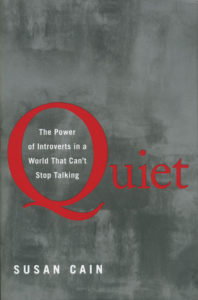Susan Cain’s meticulously researched book, Quiet is a celebration of introversion. As an introvert, I know from personal experience that there are many things about my quiet temperament that don’t get their due. Not from others and certainly not from me. I’ve struggled to explain why I’d rather sink into a book than go out to a party, why I’d rather meet close friends instead of being at a networking event or why I feel exhausted and physically spent after an evening of socializing with people. I am married to a fellow introvert who has an even lower tolerance than me for small talk, impromptu social calls and situations where he needs to meet new people.

Image Source: Goodreads
Quiet is divided into four parts: Part One starts with a look into how society came to embrace extroversion as an ideal trait, Part Two delves into the biological differences between introverts and extroverts, Part Three talks about how other cultures view extroversion and Part Four crystallizes the takeaways from the other three parts into some excellent advice for introverts and their families.
This book is packed with research and helped me understand the biological reasons behind many of the things I take for granted about myself. It’s a very satisfying read because every chapter builds on the lessons from the previous chapter.
What keeps the book from reading like a textbook are the wonderful stories. Reading about Rosa Parks, Eleanor Roosevelt, Gandhi reinforced my firm belief that introverted leaders can move mountains. I’ve worked with many introverted leaders in the past who have influenced me greatly with their quiet power. Reading about people like drummer and music journalist David Weiss who makes it a point to get in touch and reassure his childhood self that “everything turned out ok” made me feel less alone.
I also loved the story of internationally acclaimed scholar and speaker, Dr. Brian Little who hid in restroom stalls after giving talks so he could avoid having to make small talk that would exhaust him. I found his Free Trait Theory particularly interesting – That an introvert can go out of their comfort zone and “act like an extrovert” when the interaction serves a deeply personal and meaningful objective made so much sense to me.
The ‘Free Trait Theory’ made me realize why I am perfectly ok with speaking with strangers for hours when I was making a meaningful connection (even if it was a brief one) but I could not stomach being at a networking event for work no matter how many people I knew. It underscored the relevance of meaningful work in my life.
Ultimately this book empowered me. It helped me see why I am the way I am, provided basis for why a quiet temperament isn’t such a bad thing and gave me useful, actionable advice to thrive in this extrovert-obsessed world. I believe Quiet is essential reading for leaders of organizations, teachers and parents.
My favorite quotes from Quiet:
“We like to think that we value individuality, but all too often we admire one type of individual—the kind who’s comfortable “putting himself out there.” ….. Sure, we allow technologically gifted loners who launch companies in garages to have any personality they please, but they are the exceptions, not the rule, and our tolerance extends mainly to those who get fabulously wealthy or hold the promise of doing so.”
“If you’re an introvert, you also know that the bias against quiet can cause deep psychic pain. As a child you might have overheard your parents apologize for your shyness. Or at school you might have been prodded to come “out of your shell” -that noxious expression which fails to appreciate that some animals naturally carry shelter everywhere they go, and some humans are just the same.”
“Collaboration became a sacred concept—the key multiplier for success. But then we took things a step further than the facts called for. We came to value transparency and to knock down walls—not only online but also in person. We failed to realize that what makes sense for the asynchronous, relatively anonymous interactions of the Internet might not work as well inside the face-to-face, politically charged, acoustically noisy confines of an open-plan office. Instead of distinguishing between online and in-person interaction, we used the lessons of one to inform our thinking about the other.”
“There’s zero correlation between being the best talker and having the best ideas.”
“Love is essential; gregariousness is optional.”
“Don’t think of introversion as something that needs to be cured.”
Featured Image Source: https://unsplash.com/@michaelfertigphoto

Leave a Reply